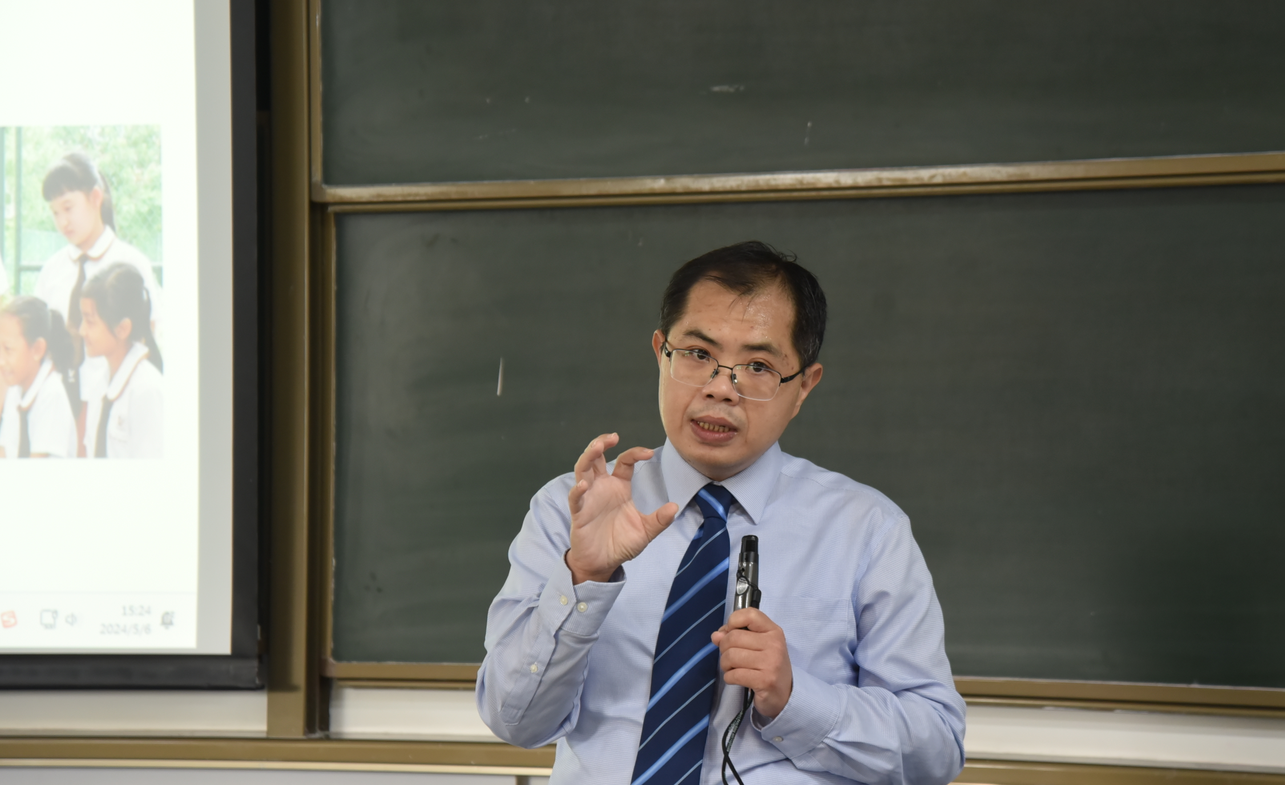
On May 6, the 24th lecture in the “Adventus Amicorum” series of seminars hosted by the Institute of Area Studies was held in the School of International Studies at Peking University. The keynote speaker was Yu Hong, a senior research fellow at the East Asian Institute of the National University of Singapore and editor-in-chief of East Asian Policy: An International Quarterly, a journal of East Asian policy research. He spoke on “China–Singapore Relations and Interpreting the State of Southeast Asia Report.” The discussion was chaired by Zhai Kun, deputy director of the Institute of Area Studies, and was attended by experts, scholars and students from multiple departments within the school and other universities.
Yu Hong started with a review of Singapore's national development and discussed the historical process of Singapore’s transformation from a third-world country in the early days of its founding to a first-world country and becoming an important global entrepot trade port, petrochemical center, financial center and shipping center. In particular, as the foundation of Singapore, the manufacturing industry helped the country increase its industrial chain/value volume, transforming it from a regional OEM manufacturing base to an R&D and marketing management center. Yu Hong pointed out that Singapore’s development as a first-world country was due to the personal characteristics and charisma of Singapore’s leaders, its unique political and governance systems and its long-standing openness and connectivity.
Yu Hong reviewed China’s rapid economic growth and greatly enhanced comprehensive national strength since its accession to the World Trade Organization as well as the major changes in China’s foreign policy in recent years, in which it has adopted a proactive and promising approach, which has led China to become an important variable in the development of the current international situation. He pointed out that a stable, prosperous China that actively participates in international affairs is crucial to the improvement of the global governance system and the construction of the regional development order and environment. In the context of the great power game and intensifying competition between China and the US, Singapore, as a highly open island economy, has chosen to adopt a “balancing” strategy, striving to maintain and strengthen friendly relations with all major powers, and hopes that China and the US can effectively manage differences and seek cooperation amid their competition.
From the perspective of China–Singapore relations, the two sides are highly dependent on each other. On the one hand, Singapore is not only the first country to support and participate in China’s reform and opening-up process but also is one of the first countries to support and participate in the “Belt and Road Initiative.” It is also a founding member of the Asian Infrastructure Investment Bank. On the other hand, Singapore is a city economy that is highly dependent on foreign trade and is capital-driven, while China has become an important investment destination country and export market for new national capital and private enterprises. From the areas of bilateral trade in goods, inter-governmental cooperation, the tourism industry, labor export and high technology, Yu Hong proceeded to illustrate the close cooperation between China and Singapore with specific case studies of Temasek Holdings, DBS Bank, Sheng Siong Supermarket and the China–Singapore (Chongqing) connectivity project.
Finally, Yu Hong focused on interpreting the annual State of Southeast Asia report. Since the beginning of 2019, the report has been issued for the sixth time, and its main research subjects come from elites in academia, business, civil society, the media, government departments, and regional and international institutions in the ten ASEAN countries. The report focuses on Southeast Asian countries’ perceptions of China and the US and assesses Southeast Asian people’s views on global hot issues. He pointed out that Southeast Asian respondents have a negative view of some of China’s policies and measures and the investment behavior of some Chinese companies in the region. China has strengthened its “hard power” through outbound investment under the Belt and Road Initiative, but China’s soft power still has a lot of room for development. He expressed his belief that Southeast Asian countries’ views and perceptions of China’s development have improved, but the overall view is complex. Although China and ASEAN are increasingly closely connected in economy, trade and investment, they lack mutual trust, and bilateral relations are still in a state of “close but not intimate.” Close bilateral economic and trade ties alone are not enough to deepen the mutual trust between China and ASEAN. This will promote the further development of China-ASEAN relations. How to enhance mutual trust between China and ASEAN member states? How to better enhance people-to-people exchanges under the Belt and Road Initiative and promote the building of a China–ASEAN community with a shared future? These questions deserve serious consideration.
In the discussion session, the teachers and students attending the seminar had in-depth exchanges and discussions with Yu Hong about the lecture. Wang Yinzhao, a doctoral student at the School of International Studies of Peking University, was concerned about the threat to Singapore’s shipping hub status from regional competition in shipping and transshipment trade between Singapore and Malaysia in recent years. Zhang Tian, a postdoctoral fellow at the Institute of Area Studies, spoke from his research experience and had an in-depth discussion with Yu Hong on urban space, the utilization of regional particularities, talent, market, and supply chain. Guo Xiaoyu, a graduate student at the Shanghai Academy of Social Sciences, mentioned the representativeness of the survey subjects in the situation report.


